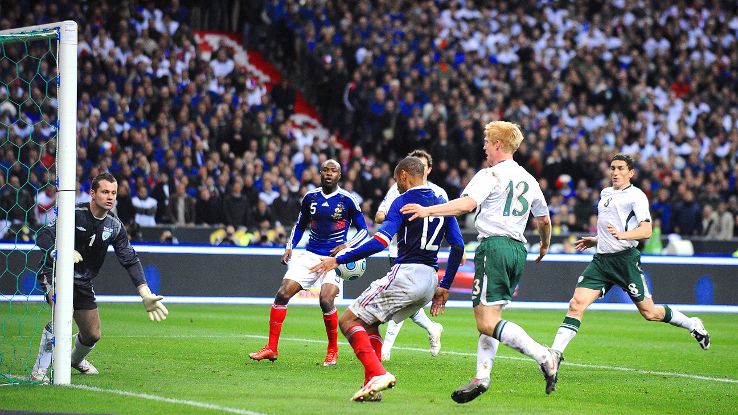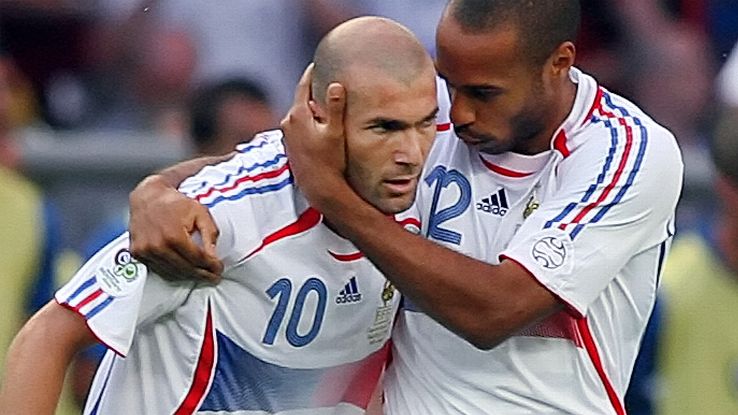Now that his MLS career is over after more than four years with the New York Red Bulls, Thierry Henry, 37, will come home. He will move back to where he belongs. No, it is not Paris or its suburbs where he was born and grew up and where his family still lives. It is not Monaco where he started his incredible career aged 17. No, home for Henry is London.
Of course, he spent eight great years at Arsenal and has a statue at the Emirates. He is the club's greatest ever player, tts top goal-scorer (228), its biggest legend and, in my opinion, the best player to ever play in England. London is also where his friends, agent and former teammates reside. It is where his daughter Tea lives, too.
But his return to the U.K. also tells you a lot about the relationship between Henry and France, his native home. Now that he has announced his definitive retirement it's time to think about his legacy and his place in the Pantheon of French football.
The story of Henry and France has always been a sort of "Je t'aime ... non plus" (I love you ... me neither). We're a complex bunch.
He never felt that his fellow Frenchmen gave him enough credit for his talent and achievements, even before his handball against Ireland in a World Cup qualifying playoff in 2009. He never felt France recognised him like he should be recognised.
Henry has always had a very high opinion of himself. You don't become the player he became if you haven't, to be fair. He was and still is far more revered in England than in France. He left our country at a young age to go to Juventus and then to Arsenal. He has the personality that doesn't fit the French standard. Like his best friend and NBA star Tony Parker, Henry's lifestyle is very anglicised.

There is no doubt that the French never fancied or understood his attitude. And the reverse is true, too. He loves London and New York, loves the spirit there more than what he finds in Paris.
His friend and former teammate Emmanuel Petit spoke to sport.fr this week and had strong words this week about the malaise between Henry and France. "In England, they've built a statue of Thierry. That means a lot. He is revered there. This bad image [in the French press] of Thierry Henry, it annoys me. What can we reproach Henry for? His handball against Ireland? He helped France qualify for the World Cup in South Africa. He has done nothing. France is hypocritical and cowardly. Sometimes I think that if we'd been overrun by the Germans, we'd be better run.
"In France, he has no collusion with the press, so what? Perhaps because he was not smiling when he scored for Les Bleus. Well, that's what I hate in this country. I have great difficulty with the French, I have never seen such arrogant, smug, lying and hypocritical people."
Of course, Petit went too far. He had to apologise for his comments regarding the Germans. But he is right. The French are arrogant and smug, especially when it comes to sport. We are not a sporting country and we don't celebrate sportsmen like other countries do.
But his words lead us to a question: what does Petit, or indeed Henry, want? A statue? We don't do statues for sportsmen. The only French football player to have a statue in his likeness is Zinedine Zidane and it depicts him headbutting Marco Materazzi in the 2006 World Cup final.

THIERRY HENRY
Clubs and goals: Total - 411 goals in 917 games
Monaco (28), Juventus (3), Arsenal (228), Barcelona (49), New York Red Bulls (52)
Monaco (28), Juventus (3), Arsenal (228), Barcelona (49), New York Red Bulls (52)
Internationals: France - 51 goals in 123 games
Trophies: Ligue 1 (1); Trophee des champions (1); Premier League (2); FA Cup (3); FA Community Shield (2); Spanish La Liga (2); Copa del Rey (1); Supercopa de España (1); UEFA Champions League (1); UEFA Super Cup (1); FIFA Club World Cup (1); MLS Supporters' Shield (1); MLS Eastern Conference (2); World Cup 1998; Euro 2000; Confederations Cup 2003.
French sculptor, Adel Abdessemed, wanted "to show the dark side of Zidane, the inevitable destiny and the immediate consequence of such an action." I am not sure Henry would have appreciated a statue of his handball against Ireland.
Perhaps Henry wants to feature higher in the poll of favourite French athletes (he voted was 10th in 2013). He was No. 1 in that poll in 2008 and in the top five in 2007, 2009 and 2010. If that's what he wants, perhaps he should open up more to the French public. There's history there.
Rewind to his handball against Ireland. To this day, I still think that anyone would have done the same thing. However, as I said, the French don't have a sporting culture. Winning at all cost? That is not us. Cheating to win? Even less so. He was never forgiven and the incident won't be forgotten.
The other strike against him, and probably the worst representation of France overseas, is the aftermath of the 2010 World Cup. The country was humiliated by the player's strike in South Africa. Henry let things spiral when he was probably the only one who could have stopped the action.
When he came back to France, he asked for a private meeting with then-president Nicolas Sarkozy. Henry went solo, tried to distance himself from the attitude of the squad in Africa. It backfired, though. French fans voiced their anger at Henry for trying to distance himself from the situation. He didn't do anything to stop the strike and now wanted to clear his name. It provided a glimpse into his personality. Yes, he can be manipulative, but he is by far one of the brightest footballers you will ever meet.
Perhaps the most interesting part of Henry's retirement, considering his history with his homeland, is the debate about where he stands among the greats of French football. Among the top five best French players of all time? No doubt. In the top three? I'm not so sure.

Zidane, Michel Platini and Raymond Kopa are all ahead of him, in my opinion.
Kopa was the first French football star. He led the country to third place in the 1958 World Cup. He was the first French export (to Real Madrid, no less). He won the European Cup three times (1957, 1958, 1959). He was a wonderful player.
Platini was a fantastic leader with an incredible nose for goal, a wonderful right foot and fantastic vision. He had success with Juventus (with whom he won the European Cup in 1985) and France (winning the 1984 European Championship).
Finally, Zidane was simply a genius. He could do anything and everything with a football. He was a joy to watch, whether he was playing for France, Juventus or Real Madrid. His goal in the 2002 Champions League final remains, for me, the most beautiful goal in the competition's history.
Each of those three have won at least one Ballon d'Or. Kopa in 1958; Platini in 1983, 1984 and 1985; and Zidane in 1998.
But Henry is right up there, not all that far from them. He has no Ballon d'Or, an injustice that he still feels today. I know not winning the award is his biggest regret. I still believe that it should have been his in 2003 instead of Pavel Nedved or in 2004 rather than Andriy Shevchenko.
With 51 goals in 123 caps, Henry has scored more goals than anyone in a France shirt and has the second most caps in the country's history. He won the World Cup in 1998 and the Euros in 2000. He was a penalty away from winning a second World Cup in 2006 against Italy. He had great moments, great games and scored great goals wearing the blue shirt.
He won the Champions League in 2009 with Barcelona as well as league and domestic cups in France, England and Spain. He had some incredible performances and scored even better goals at club level than he did with France.
He was always better when he wasn't counted on to lead, though. It happened at Arsenal. After Patrick Vieira left, Henry took over the captaincy and never won anything again with the Gunners. At Barcelona, Carles Puyol and Xavi handled such responsibilities, and they won. In New York, he wore the armband and secured only a Supporters' Shield.
The same is true for his career with France. From 1998 to 2006, Henry followed the leaders and silverware became the norm. When Zidane retired and Henry took his place, from 2006 to 2010, France had their worst years of the past two decades. And one day, his record of 51 goals for France will be beaten, probably by Karim Benzema.
More than the trophies he won, more than his complicated relationship with his homeland and more than his place in France football's history, Thierry Henry will forever be remembered for the magic he made. Because going to watch him play involved being captivated by his talent, and we will miss that dearly.








0 comments:
Post a Comment
ff on Twitter: @TheNaijaInfo
Facebook.com/NaijaInfo
Email: TheNaijaInfo@gmail.com
What do you think about this post?